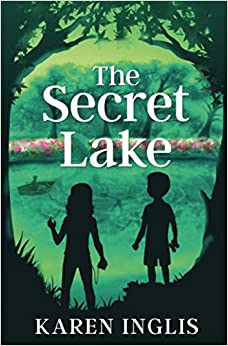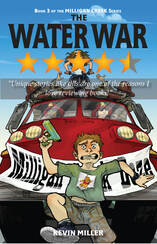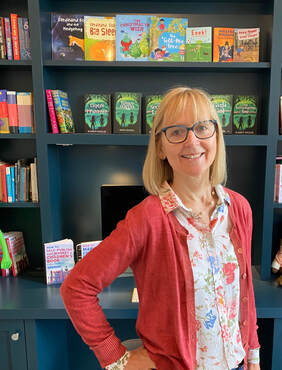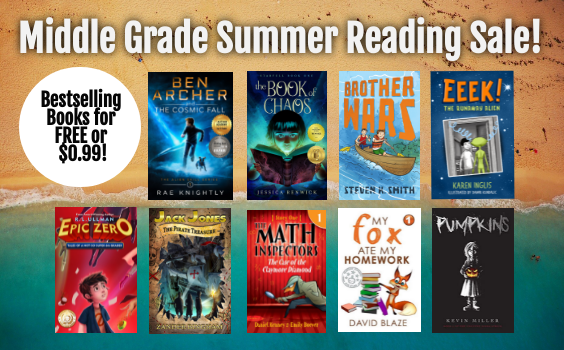|
That's right, folks, you can now listen to Up the Creek, Unlimited, and The Water War, all of them narrated by Kimberley, BC's own Tanner De Bruyne. The audiobook versions are available on Amazon, Audible, ACX, and Apple Books. You can listen to the first chapter of The Water War for free here. They'll make for great listening on that end-of-summer road trip!
0 Comments
 Who were some of your early inspirations as an author? Without a doubt Alice in Wonderland and The Lion, The Witch and The Wardrobe — stories that take children into other worlds have always fascinated me. That apart, I have vivid and fond memories of being read The Wind in the Willows by my mother. Much later and into my teens I loved Dickens and Jane Austen — all that wonderful visual detail mixed alongside the historical fiction. How did you get started as an author? Did you start by writing books or something else? I was not someone who grew up thinking I wanted to be an author. I was far too busy riding my pony, which took up every spare hour! However, I always kept diaries and loved writing long essays at school. Writing and "explaining" seems to be in my DNA and it’s perhaps not surprising that I became a professional copywriter and writing training consultant after university. Oh, and prior to that I taught English as a foreign language for several years and ended up writing the content for a weekly teaching syllabus, which I sold to the school. As far as fiction goes, I started a few "grown-up" novels in my post-university days, and those are all in a drawer here somewhere. However, it was when our boys were little that I became inspired to write for children. Many of the picture books and short stories I read to them were great, but a fair few were not, and it got me thinking that perhaps I could do better! Nevertheless, it took seeing something magical for the spark to come. In my case it was a beautiful fox trotting down a path on a foggy November evening. I just couldn’t get him out of my mind, wondering where he was going and what he was thinking. Thereafter my rhyming Ferdinand Fox stories started to emerge. I have had six fully written for years but only two self-published because organizing illustrations is so complicated, time consuming, and costly. I’m hoping finally to resolve that in the coming year now that I have more budget to play with. The Secret Lake has become something of a phenomenon, continuing to top best-seller lists ten years after it was first published. What inspired the book? It was one of those magical moments that I mention above. Some friends of ours moved into a lower-ground/ground-floor apartment in converted grand Victorian terrace that backed onto a huge communal gardens area in west London near Notting Hill. The gardens are entirely safe and enclosed and made up of lawns and woodlands, just like in the film Notting Hill. The first time I walked out and saw all the children playing there, with the echo of their voices and the cracking twigs bouncing off the houses all around, my spine began tingling as I started to picture the children who must have lived in those grand houses 100 years earlier and played in those gardens and wondered what would happen if the children playing here today could meet those children from the past. It was a combination of that visit and location, and a magical woodland in Richmond Park called Isabella Plantation where we used to take our children that inspired the story. I grew up in the countryside and was allowed to go off into the woods on adventures for hours at a time, and both of the places above brought back those memories. Once the idea came to me it wouldn’t go away! At what point did you realize you had a hit on your hands? It was a very long road. What I can say is that from the moment I did my first events in September 2011 at a local school and the local library, children, teachers, and librarians were captivated. To that extent I knew it was a good story, and it continued to be very well received at school visits. By the end of 2017, I had sold around 7,000 print copies, mostly at school events or local bookshop signings (including Waterstones, our largest bookshop chain, whose local branches welcomed me). Online sales were relatively low until then as very few people knew to look for the book. It wasn’t until the spring of 2018 that it began to sell in huge numbers, and that was all down to discoverability after I managed to get early access to Amazon advertising here in the UK. From that moment I saw online sales start to rise, and gradually more reviews started to roll in. Eventually, that translated across to the USA and Canada, further helped by getting access to Amazon Advantage advertising there. To be honest, I fully expected the success to be short-lived, but it seems to have carried on, which is very humbling. I never take it for granted though as trends come and go. I still remember paying £4 to park my car to deliver two copies on consignment to Waterstones in the early days and realizing that the cost of the petrol and parking was more than the royalty I might make! Why do you think the book has resonated with so many readers? When I wrote The Secret Lake, I did so because I felt there weren’t enough "new" classic children’s adventure stories out there with a touch of magic thrown in — the sort that I had enjoyed as a child. Interestingly, when I sent it out to a handful of publishers way back in the early days, the response I got was it was "too traditional" and had been done before and that children were looking for something more modern. Oh, and it was the wrong length — too short! Ironically, I think the book has resonated for all the reasons it was rejected. Children still love a classic adventure, and many like a book of a manageable length. The fact that the two main characters are a boy and a girl help too, I think, as the story genuinely appeals to both. From the feedback I’ve had from readers, I also think the fundamental themes of friendship and loyalty across time have touched children’s hearts. And what’s really surprised me has been the demand for foreign rights. It’s now in translation in 8 languages despite being rooted in historical England, which I had understood initially might go against it. What draws you to write for children? Do you plan to write for other audiences too? As I mentioned earlier, the spark for my stories is always external -- something I see or hear or feel -- and that, I think, explains the variety of age groups I write for. In other words, what the story will be is out of my hands to some extent. Thus, my latest picture book The Tell-Me Tree, for ages 4-8, was inspired by a majestic London plane tree that sits on Barnes Green close to where I live. Walking past it one evening, I suddenly noticed a face in its trunk and couldn’t get it out of my mind (as with the fox earlier). It took three more years before the story came to me after overhearing a parent’s conversation about a child who’d been unhappy at school. You can read the full detail of that over at my blog. This is probably the easiest way to explain what draws me to write, and it’s simply based on my reaction to things around me. The audience for my stories is, of course, dictated by the nature of the story. As far as adult fiction goes, I do have one futuristic story largely mapped out in the drawer. This is the one time I decided to sit down and try to plot in advance in some detail. The trigger for this (one of my "tingly" moments!) was something I heard on a natural sciences documentary radio program. That story will not go away, and my son (who also writes and has seen the outline) has been nagging me to get on with it. I just need to find the time! It’s aimed at new adult/adult rather than young adults, though I’d love to write something for YA at some stage. With The Secret Lake in particular, what motivated you to publish independently rather than going the traditional route? As mentioned earlier, I did pitch the early drafts of The Secret Lake to publishers, but I didn’t get anywhere with it. Back in those days, there was no email; it was all done by snail mail! Whilst I didn’t get anywhere with The Secret Lake, I did have a "close shave" with my illustrated chapter book Eeek! The Runaway Alien. In this case Bloomsbury said they loved the story and my writing style but that the book was the wrong length for their lists. They asked for more examples of my work; however, when it eventually came to nothing I realized that the chances of getting picked were not only very slim but also down to luck and the taste of the person reading your manuscript. At that point I put my writing in a box for 10 years and went back to my day job of professional copywriting. It was when I pulled it all out again in 2011 that I started reading about self-publishing and was immediately attracted by the control it would afford me. What are some of the biggest benefits of being an independent author? Control, control, control. I love everything about it! And the tools and platforms now available to support independent authors during their journey have come on leaps and bound since I first started self-publishing. In addition, there are fantastic communities of indie authors ready to help each other — both informally through niche groups and more formally through organixations such as the Alliance of Independent Authors and Self-publishing Formula. What are some of the biggest challenges? Finding hours in the day to fit everything in! I am currently author, advertiser, marketer, PR department, illustration briefer, translation manager, foreign rights manager and bookkeeper! I’d say the main challenge within all of this is marketing, which is especially difficult for children’s authors as our audience is not online, don’t hold the purse strings, and prefer to read in print. This, in turn, means that "spur of the moment" online purchases are far less likely to occur in the way they might do for young adults or adults buying eBooks, which they know they can start reading in a matter of minutes. However, Amazon advertising has helped hugely by enabling us to promote our books to people already looking for children’s books. But there is a lot of competition and a big learning curve to try to fathom the algorithms! Have you ever received offers to publish your books traditionally? What would it take for you to go that route? Yes, on a couple of fronts. I had one offer four years ago from a mainstream UK publisher to write the equivalent of my non-fiction book How to Self-publish and Market a Children’s Book, the second edition of which has just come out. I turned that offer down as it didn’t make sense financially. It also felt odd to contemplate publishing a book about self-publishing traditionally! Also, I worked out that by the time the book went to publication, after a seven-month cycle it would be out of date. They also had a format they wanted me to follow that didn’t feel right. With my professional copywriting hat on, I have a very clear idea of how I want to structure non-fiction and wouldn’t have felt happy trying to fit my content into a different template. It’s all about control! I’ve also had two separate offers to work with traditional publishers for my fiction. I’m more open to this if the financial rewards make sense. However, with the income an international bestseller can make me, that becomes quite a challenge when you start to apply traditional publishing royalty rates. But I’ll never say "never" if I get the right offer from the right team! What advice to you have for other indie authors, particularly those who are writing for children? Be clear in your mind what age group you are writing for before you put pen to paper. Read as much as you can in that age group (and those on either side) and become intimate with the themes, character ages, page count/length, use of language, frequency and style of any illustrations, etc. The biggest mistake aspiring children’s authors make is coming up with an idea and setting off writing but not being clear who their target market is. What are you working on right now? Having spent the first part of this year writing How to Self-publish and Market a Children’s Book (Second Edition), I’ve had lots of admin to catch up on as well as tackling longstanding marketing catch-up tasks. For examples, I’ve just finished updating the cover of Eeek! The Runaway Alien, something that has been long overdue! Next up, I’m finally about to sit down and start reading and researching the Victorian/Edwardian period and literature to see whether there are other stories around the world of The Secret Lake that are waiting to be told! I get so many requests about this but always say I will only put pen to paper if I can be sure any follow-on book would be as magical as the first. So, it’s very much a case of "watch this space" for now . It will all depend on whether I get my special tingly feeling! I have something very cool for you today. To encourage more summer reading, I’ve teamed up with a number of bestselling middle grade authors to offer nine incredible ebooks, all of which are either FREE or just $0.99 each!
I can attest that all of these books are high quality and well reviewed, and you will not be disappointed! These deals are available from August 1-5 and the links are below. Here is the amazing lineup:
I hope you’re having a great summer! |
Kevin MillerBrief thoughts and updates on writing, publishing, and life Archives
June 2024
Categories
All
|
 RSS Feed
RSS Feed


